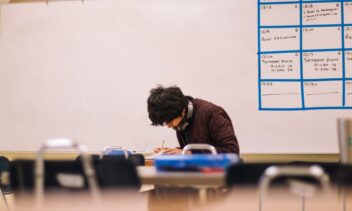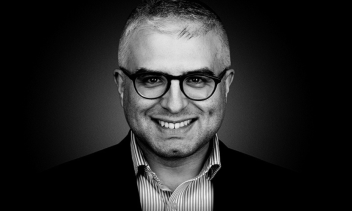“When I heard that the Rav was coming, I was so excited, I almost wanted to dance.”
Halfway through my first year of college, I was homesick for a place I’d never been.
I didn’t have high expectations for my time at Yeshiva University to begin with, but I knew that whatever I was feeling was far from what I had hoped for. After two years of full-time Torah study in an Israeli yeshiva, religion was starting to feel like a weight I was dragging around.
In the mornings, I rolled out of bed to pray in the shul of the dorm lobby. I’d arrive early and even feel prepared for tefilla. I would pray standing up, clutching the siddur so tightly my thumbs left impressions on the pages. I wanted to connect badly, but it felt like despite my trying, all I could hear was the echo of my religious goals and ideals tumbling down the dormitory stairs behind me, trailing behind me too late into minyan.
I had no religious mentor, no meaningful relationship with any teacher, and absolutely no plan for what I should do with my life or how to fill it with meaning. Reflecting on that time much later, I realized that I felt such little purpose in my religious life and observance that I was flirting with letting it slip away.
Then, one day, I prayed again.
I mean really prayed.
Sort of.
It felt like prayer, at least. On that late winter night, in a room I never felt comfortable in, I approached a long-bearded man and cleared my throat.
***
“Az, bo nirkod – so, come—let’s dance!”
There is an ancient Jewish tradition—codified almost 500 years ago and still practiced today—that before praying the Amidah, one should take three steps backward, pause, take three steps forward, and, only then, begin.
I took three steps backward before offering a prayer to someone I had never met before. In the back of Yeshiva University’s Glueck Beit Midrash, he stood out with his long white beard, and the frayed navy blazer he wore to blend in wasn’t fooling anyone; he didn’t seem to belong there.
The man was Rabbi Dov Singer, who six years later remains one of the most influential religious voices in my life. I didn’t know much about Rav Dov, as he’s affectionately known (“Please—up there, they call me ‘Dovi’”), only that he had recently published a small book that my older brothers were especially excited by. That was enough for me to want to connect with him, and his then-somewhat-unknown status in Yeshiva University’s Torah-learning circles left him wide open for approaching.
I came up from behind.
“Ehem,” I began. “When I heard that the Rav was coming, I was so excited, I almost wanted to dance.”
“Az, bo nirkod! – so, come—let’s dance!”
Grabbing my hands, he pulled me to the back of the room, and with a closed-eyed smile I’d come to know as signature, sang a tune and danced with me in the back of a beit midrash where I still felt uncomfortable.
***
“So come—let’s dance!”
Rav Dov was born in 1957 to Holocaust survivors and raised in a suburb of Tel Aviv. He went to high school at the storied Netiv Meir Yeshiva in the Bayit V’Gan neighborhood of Jerusalem, and then studied in the Old City’s Yeshivat HaKotel before serving in the IDF’s armored brigade. It was at HaKotel that Rav Dov met and grew close with Rabbi Shimon Gershon Rosenberg—known as “Rav Shagar”. It was this relationship that would come to steer Rav Dov’s life more than others: “Above everything else,” Iris, Rav Dov’s wife, told me in their home in Tekoa, in the West Bank, “we are students of Rav Shagar.” Along with the late Rabbis Menachem Froman and Adin Even-Israel Steinsaltz, Rav Shagar is credited with sparking a Hasidic and spiritual revival in Israel’s National-Religious community (commonly thought to be somewhat analogous with Modern Orthodoxy in America, though different in significant ways).
As Elchanan Nir puts it in his introduction to Rav Dov’s prayer “cookbook,” Prepare My Prayer (Maggid, 2020), those three rabbis—Shagar, Froman, and Steinsaltz—changed the religious discourse of their shared community. They provided a space for a more personal religious experience, using a “language that leaves room for dialogue. In place of exclamation points, these three rabbis … cultivated a more particular, more subjective language—a language that allows space for question marks.” In the religious framework they were creating, it suddenly became okay to want faith but feel doubt, to want closeness but feel far. As their student, Rav Dov continued the revolution. When the rabbis started Yeshivat Mekor Chaim, they tapped him to head it—a position he still fills, more than three decades later.

Rabbi Zinger has achieved some renown in Israeli National Religious culture. (When my wife and I were living in Jerusalem, our Israeli friends would literally gasp when they heard we were heading to Rav Dov’s for Shabbat.) Much of the English-speaking world’s understanding of Rav Dov has been shaped by his teachings and educational philosophy at Mekor Chaim. In Nir’s introduction, for example, he lists the four foundational principles Rav Dov developed at the yeshiva and which he continues to strengthen: mutual trust between student and educator; the authenticity an educator must present herself with; the necessity for a teacher to practice active listening; and, finally, presence: “People must be fully present in reality, must make space for others to be present in reality, and must make room for the hidden presence, for God, and be present with them.”
For Rav Dov, education can be at its most powerful when proactive, and at its weakest when being reactive. Where others have focused on the importance of boundaries and rules in education, Rav Dov has focused on what happens inside those boundaries—that is, the content. In his own words:
I generally tell people who deal with boundaries to first examine themselves. It’s important to talk about boundaries, but to keep it in proportion … Our Rabbis tell us that the Torah was given “Black Fire on White Fire” (Shekalim 16b) … Many laws of writing a Torah are dedicated to the rules of the ‘black fire’: the shape of the letters, the words of the Torah itself, which are written in ‘black fire’. There are also laws dedicated to the ‘white fire’, the Hilkhot Gevil, the laws which deal with the parchment, the white klaf upon which the Torah is written. The white fire is the background on which the black fire of the letters of Torah, what we think of as the content, are written.
Think of a principal’s office and you’ll likely think of punishment and trouble—in other words, a principal’s job, much of the time, involves strict discipline: negative reinforcement, laying the boundaries. Instead of focusing solely on setting hard boundaries, though, Rav Dov, like any great teacher, uses his office for content, for positive guidance. I like to think of one example that received recognition from across the world: In the summer of 2014, three Israeli teenagers—Naftali Frenkel, Gilad Shaer, and Eyal Yifrah—were kidnapped and murdered by terrorists. The boys were students at Mekor Chaim, and Rav Dov delivered the eulogy at their funeral. Rav Dov charged tens of thousands of mourners with loving thy neighbor as yourself. “Two Jews, three opinions, but one heart,” he said. While tragedy in the Jewish community is sometimes met with harsh rebuke, a call to better ourselves in some area that the speaker deems the community to be neglecting, Rav Dov chose guidance—content over boundaries.

There’s no doubt that Rav Dov’s reputation as an educator is well deserved. In the English speaking world, though, the spotlight has mainly been placed on his impact on our relationship with prayer. After years of counseling couples (mostly former students), Rav Dov felt that the main issue couples were facing was the lack of genuine and direct communication with each other. To put it another way, spouses weren’t telling each other what they were really feeling. The connection between this lapse in relationships and the problems it was causing was obvious; for Rav Dov, so was the parallel to prayer—that is, our relationship with God. We struggle to pray with God because we struggle to communicate with God, and we struggle to communicate with God because we struggle to communicate with others, even with ourselves.
“I would look at how people were praying in shul and say ‘This is a problem,’” Rav Dov once told me. “And I felt it was a problem that could be fixed.” That solution became a book—Tikhon Tefilati, published in 2017 and translated into English as Prepare My Prayer in February 2020. (The first chapter, along with Nir’s introduction, was published online ahead of the release.)
So, on a February night in 2018, Rav Dov found himself standing in the back of the Yeshiva University beit midrash, partly because of the new university president, Rabbi Ari Berman, and his stated commitment to “Torat Eretz Yisrael,” and partly because Mekor Chaim was undergoing a building campaign for a new campus; Rav Dov’s sabbatical that year, coinciding with the third printing of Tikhon Tefilati, made it a great opportunity for a sort of book tour throughout American Jewish communities, anchored by a three-week stay in Washington Heights, New York, at the university’s men’s campus.

***
“So come—”
I don’t know what made me go up to Rav Dov that night in YU—I’m sure I wasn’t expecting him to pull me into a dance in the back of a massive beit midrash filled with people. That moment led me to attend the prayer-centered classes he started giving while visiting the school. Those classes inspired me to start communicating differently with myself, and then with those around me. Eventually, I was praying differently—I communicated differently with God. Alongside all this was his book: More than a book on prayer or on God, Prepare My Prayer is Rav Dov teaching how communication was often the remedy; Prepare My Prayer wasn’t just a book on how to talk to God but also a book on how to talk with others, with ourselves. Reading it made me want to spend every moment I could around him—so I did.
Rav Dov’s “classes” always felt more like a conversation with friends than a Torah study group; now, looking back on them, they feel more like a magic show.
One night, Rav Dov led over a dozen students—and at least one YU rosh yeshiva—into tree-lined Highbridge Park. A half-hour before, we were gathered in the same classroom used to teach Talmud with an intensely complex methodology to hear Rav Dov teach a formula for practicing hitbodedut, a method of lengthy, solitary, free-flowing prayer. Experience being the best teacher, we followed him to the park.
Each member of our group split up to find their own spot under the trees—we were not allowed to reconvene until 15 minutes later, after each of us had tried the practice. Before 15 minutes later came, different sounds could be heard from pockets of the park. Sobs. Laughter. Clapping. Yelling. What started as a skeptical moment quickly became something else. We shared our experiences; the rosh yeshiva described reaching a sense of closure in his relationship with his late father, others described feeling overcome with emotion.

A few years later, while he was in America for the launch of Prepare My Prayer, I was driving Rav Dov from one speaking engagement to another. Each time we drove between venues, Rav Dov would wait for an empty spot on the side of the road and ask me to pull over for a few moments. Having been to the Singer’s home in Tekoa and seeing Rav Dov’s relationship with Iris, I assumed he was calling to frequently check in with her; I realized later that these brief interruptions were for moments of Rav Dov’s own hitbodedut—a different kind of checking-in altogether.
The power of a like-minded group of people—of “chaburah”—was a focal point of Rav Dov’s on that trip (Rav Dov has a teacher’s training program focused on meeting in such groups). Late-night chaburot would focus on his facilitating conversations between us, teaching us how to be vulnerable and, more importantly, how to accept the vulnerability of others.
In one session, Rav Dov had us sharing ambitions with one another—a person would pick a partner across the table, tell them their dream, and the partner would in turn respond, “I hear you.” A friend went first and shared his ambition with me. “I hear you,” I answered, “and that’s tov meod—wonderful.” Sternly, Rav Dov chided me: “Judging favorably is still judging. We are practicing acceptance, not judgment.” The friend went again.
***
“Let’s dance!”
Some time has passed since my last real conversation with Rav Dov. In the meantime, the world had changed—Rav Dov was one of the first positive COVID-19 cases in Israel, following a trip to the East Coast, where I had driven him around. After getting married, I, and my wife, Rachel, lived in Jerusalem for a couple of years. I would bump into Rav Dov now and then, mostly at his monthly Rosh Chodesh musical prayers.
Eventually, we made the difficult decision to come back to New York, where we’d be closer to family and I’d be starting a job teaching at my old high school. But as our last few weeks in Israel were flying by, and determined to make the most of our time left there, I reached out to Rav Dov.
“HaRav,” I texted, “We’re leaving. To America. Soon. Is shabbat with you still possible?”
I put away my phone and forgot about it, hoping that despite his busy schedule, he would see my text and invite us in a week or two.
“Wow,” he replied that night. “This shabbat. Happily.”
Infant daughter in tow, Rachel and I made the trip out to Tekoa on Friday afternoon. Our daughter climbed on their furniture, Rachel and Iris spoke about the challenges of leaving family and of leaving Israel; Rav Dov taught me meditative breathing in their backyard.
Six years earlier, everything Rav Dov was teaching felt urgent—it was brand new, and I needed it like oxygen, chasing every chaburah he was leading and class he was teaching. He was showing me how to pray, and prayer was what I needed. Now, sitting on a swing next to his house in the early summer Shabbat afternoon, everything was calm. This was post-prayer, what life looked like after learning to talk. What I gained from Rav Dov when I first met him felt like it was saving my spiritual life at the 11th hour; what I was experiencing with him now felt like life itself.
I never liked hearing about people’s lives changing in an instant; those stories made me envious of the people they happened to, as if all that stands between the reality you live in and the reality you want is a single stroke of good luck, one good moment.
The late writer Joan Didion wrote that it’s more accurate to say that life changes in the moment—that is, the moments that make up our lives, the day-to-day minutiae, when made meaningful, change our lives. Rav Dov changed my life from the instant I met him because he showed me the instant—from the moment I met him, I wanted my moments to be blessed, to be made meaningful.
I told him as much, the night before he left YU that first trip in 2018. He replied with a kiss on my head, and I knew that I had found that figure in my life I was looking for.
That Shabbat night in Tekoa, standing in pajamas in the Zinger’s home, I said goodnight and thanked our hosts one more time. Iris smiled. “Maury,” she said, “this is just the beginning.”
I tip-toed into the guest room and started crying. What she said moved something in me—she meant it was too early on in our Shabbat together to be thanking them, but what I heard was more about this long journey I was on, the one Rav Dov was helping me navigate, the one that started with a lost college sophomore and is now continuing with a young husband, father, and teacher.
Leaving Tekoa after that Shabbat felt like we were leaving so much behind; it felt like saying goodbye to Rav Dov and everything I had learned with and from him. But I kept hearing Iris saying, “This is just the beginning.” We’re just getting started. Rav Dov’s teachings are touching more and more people and, personally, are still guiding our lives.
It’s still happening.
Life is still changing in the moments.
We’re still dancing.
Maury Rosenfeld is a high school teacher in New York. Before that, he worked as an editor at 18Forty and a speechwriter for the OU. He lives with his wife and their family in Long Island, and struggles with writing witty bio blurbs.








